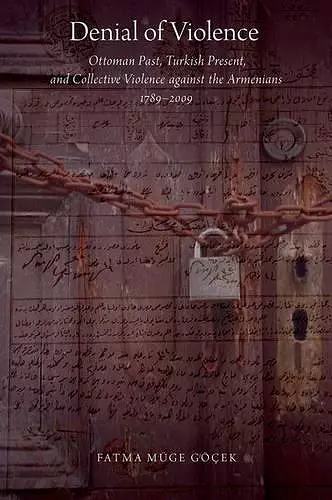Denial of Violence
Ottoman Past, Turkish Present, and Collective Violence against the Armenians, 1789-2009
Format:Hardback
Publisher:Oxford University Press Inc
Published:20th Nov '14
Currently unavailable, and unfortunately no date known when it will be back
This hardback is available in another edition too:
- Paperback£55.00(9780190624583)

While much of the international community regards the forced deportation of Armenian subjects of the Ottoman Empire in 1915, where approximately 800,000 to 1.5 million Armenians perished, as genocide, the Turkish state still officially denies it. In Denial of Violence, Fatma Müge Göçek seeks to decipher the roots of this disavowal. To capture the negotiation of meaning that leads to denial, Göçek undertook a qualitative analysis of 315 memoirs published in Turkey from 1789 to 2009 in addition to numerous secondary sources, journals, and newspapers. She argues that denial is a multi-layered, historical process with four distinct yet overlapping components: the structural elements of collective violence and situated modernity on one side, and the emotional elements of collective emotions and legitimating events on the other. In the Turkish case, denial emerged through four stages: (i) the initial imperial denial of the origins of the collective violence committed against the Armenians commenced in 1789 and continued until 1907; (ii) the Young Turk denial of the act of violence lasted for a decade from 1908 to 1918; (iii) early republican denial of the actors of violence took place from 1919 to 1973; and (iv) the late republican denial of the responsibility for the collective violence started in 1974 and continues today. Denial of Violence develops a novel theoretical, historical and methodological framework to understanding what happened and why the denial of collective violence against Armenians still persists within Turkish state and society.
acknowledgement of the long term consequences of violence for perpetrators as well as victims as well as an integration of the aftermaths of the Genocide into wider histories of modern Turkish politics and society is an important departure from the existing literature ... Such willingness to engage with complex and prolonged patterns of violence rather than simply reproduce national narratives in painting all Turks as perpetrators and all Armenians as eternal victims is another strength of this work ... a welcome addition * Dr Joanne Laycock, Reviews in History *
At the heart of Fatma Müge Göçek's book is the claim that forgetting doesn't just happen. Rather, forgetting (and remembering) happens in a context, with profound political and personal stakes for those involved. And this forgetting has consequences. Denial of Violence looks at how this process played out in Turkey in the past 200 years. ...thoughtful and intellectually rigorous. * New Books Network *
Göçek's Denial of Violence is vast and defies easy characterization ... By bringing the story of denial across historical periods that had been separated primarily to map the political needs of nationalist politicians, Göçek can also shed light on the specific motivations of Turkish officials in the 1920s to mount a campaign of denial ... [a] magisterial book * Keith David Watenpaugh, American Historical Review *
- Winner of Winner of the 2015 Mary Douglas Prize for Best Book: Sociology of Culture, American Sociological Association. Honorable Mention from the 2016 Barrington Moore Book Award: Comparative Historical Sociology, American Sociological Association..
ISBN: 9780199334209
Dimensions: 168mm x 239mm x 41mm
Weight: 1015g
680 pages